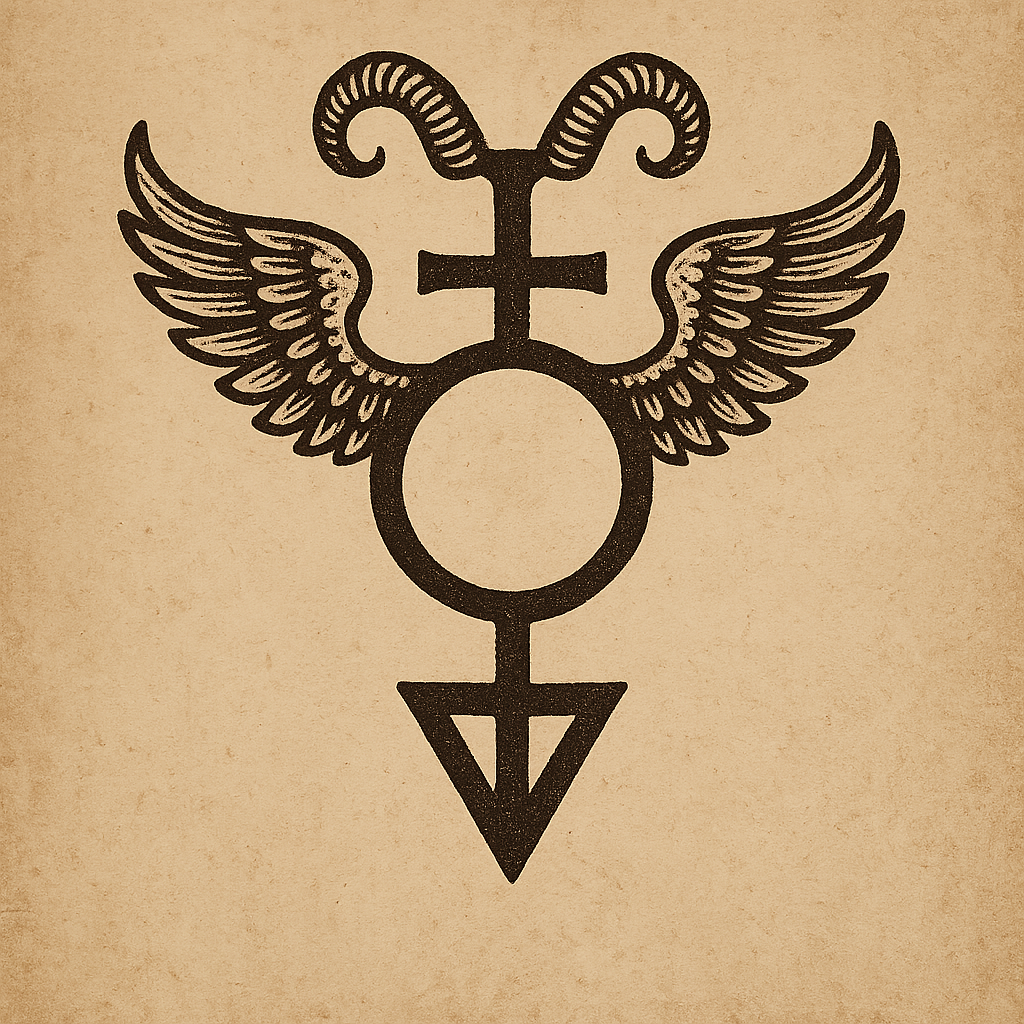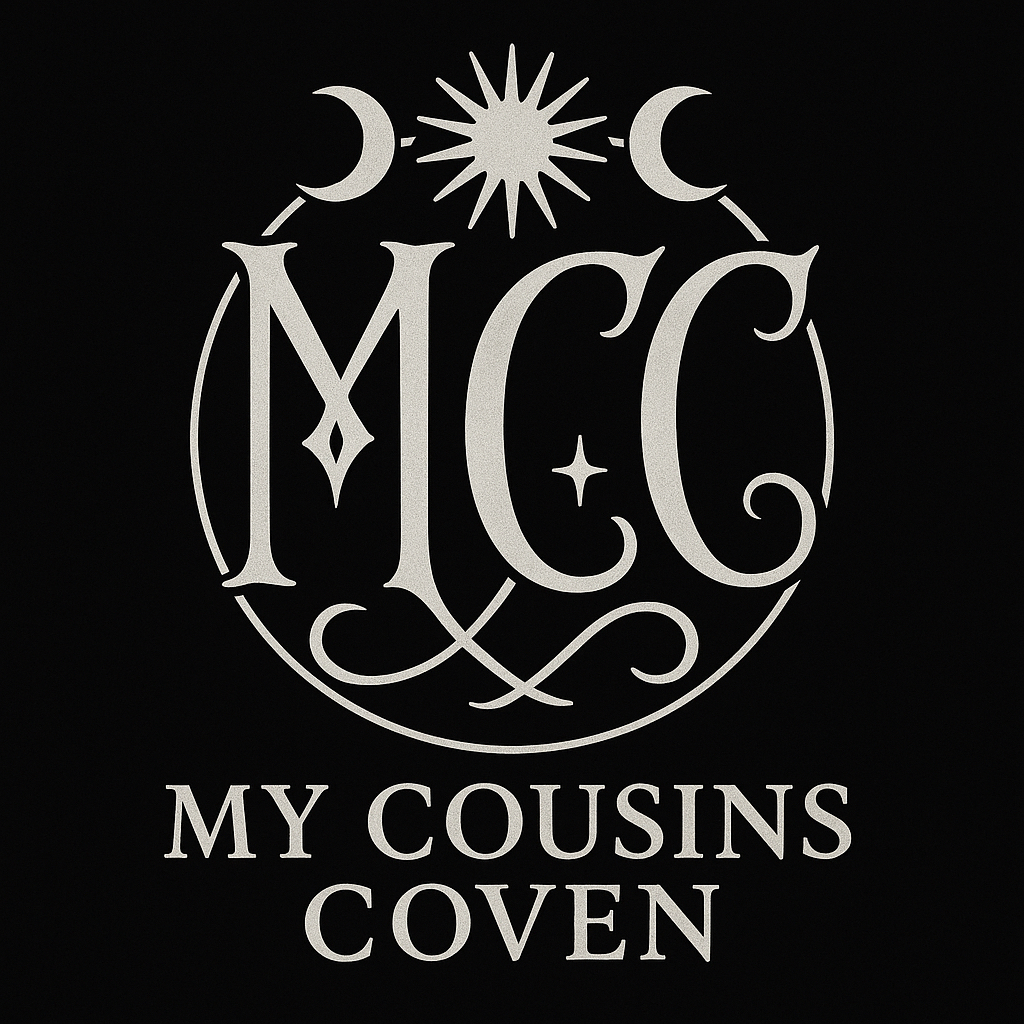The Architecture of Interruption
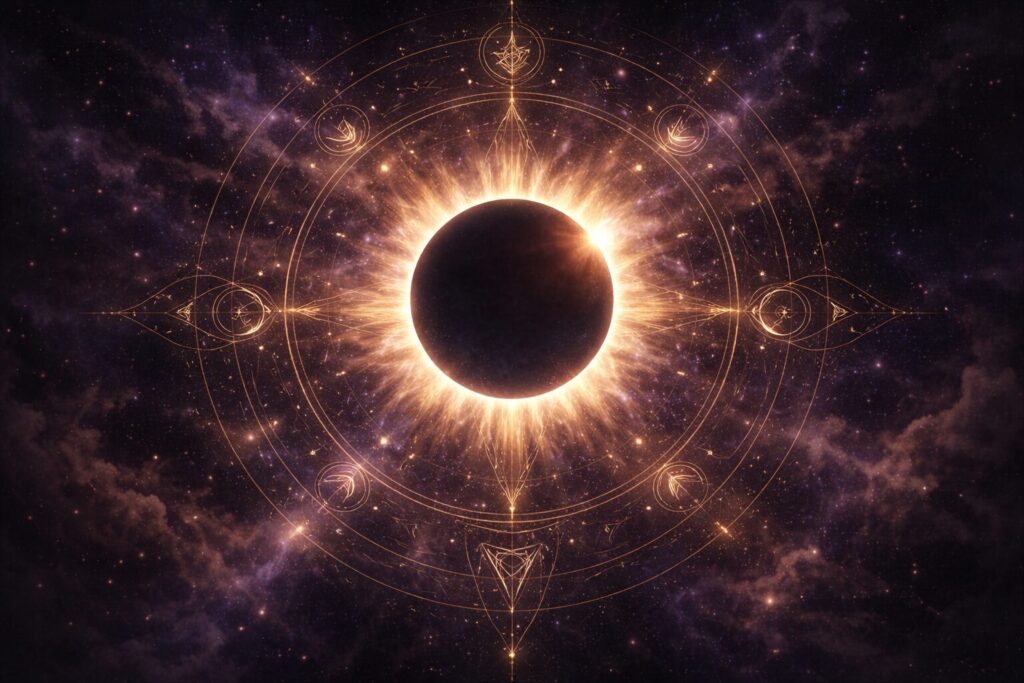
An eclipse is not simply a dramatic sky event. It is a structural disturbance in the rhythm that normally governs perception. The Moon interrupts the Sun, or the Earth interrupts the Moon, and for a moment the cycle reveals its machinery. What we take as steady light is shown to be contingent. What appears eternal is revealed to be relational. This is why eclipses have always carried a reputation beyond astronomy. They expose dependence. They show that order is maintained through motion, not permanence.
In magical thinking, eclipses are not treated as “stronger full moons” or “special new moons.” They are anomalies — intentional fractures in the pattern. A practitioner working with eclipse energy is not trying to amplify a goal in the ordinary sense. They are engaging a threshold state where assumptions loosen. Eclipses suspend continuity. The usual pathways between cause and effect feel temporarily rearranged. For this reason, traditions differ wildly in their advice: some forbid eclipse workings, others reserve them for decisive rites that cannot be performed at any other time. Both positions recognize the same fact — eclipses are unstable power.
Energetically, an eclipse behaves like a corridor rather than a peak. It is a passage where the symbolic lights that orient identity — the conscious Sun, the reflective Moon — fall out of alignment long enough to reveal the space between them. That space is not empty. It is dense with reconfiguration. Old patterns flicker. Hidden motives surface. Timelines that felt fixed suddenly show alternatives. Many people experience eclipse periods less as magical “events” and more as psychological weather: vivid dreams, abrupt realizations, endings that feel inevitable, beginnings that arrive already charged with consequence.
Historically, eclipse mythology rarely frames the phenomenon as gentle. Cultures describe dragons swallowing the Sun, wolves devouring light, celestial battles, divine warnings. These stories are not primitive fear; they are symbolic literacy. They recognize that interruption is frightening because it dissolves orientation. When the sky itself behaves unpredictably, the human nervous system interprets it as a message about vulnerability. The occult reading of eclipses inherits that literacy. It treats the event as a reminder that control is provisional, and transformation does not always ask permission.
For witches and ritual practitioners, the eclipse is best understood as a calibration point. It is not a time for casual manifestation. It is a time for reckoning with trajectory. What you are feeding will accelerate. What is unstable may collapse. What is hidden may no longer tolerate concealment. Eclipse work is therefore less about “getting something” and more about consenting to a shift already in motion. The rite is not an imposition on the cosmos. It is an agreement to move with it.
To work consciously with an eclipse is to accept that you are entering a conversation with forces larger than personal preference. The event does not bend to the practitioner; the practitioner aligns with the event. This is why eclipse magic has always carried an initiatory tone. It is less a tool than a test. It asks: if the lights go out, what remains oriented inside you?
Eclipses — How the Current Behaves
Eclipses are not “bigger moons.” They are interruptions: alignment events that temporarily disrupt the ordinary relationship between light and reflection. In magical terms, they tend to behave like thresholds, accelerators, and truth-exposers — powerful, but less stable.
Lunar eclipse overlays the Full Moon (visibility) with shadow: illumination that becomes unavoidable, often exposing what has been growing underneath the surface.
Chaos invitation: asking for change without boundaries (“shake up my life” spells can deliver literally).
Ethical drift: using volatility to justify coercive work.
Noise for wisdom: mistaking intensity for truth — eclipses reveal, but interpretation still requires discipline.
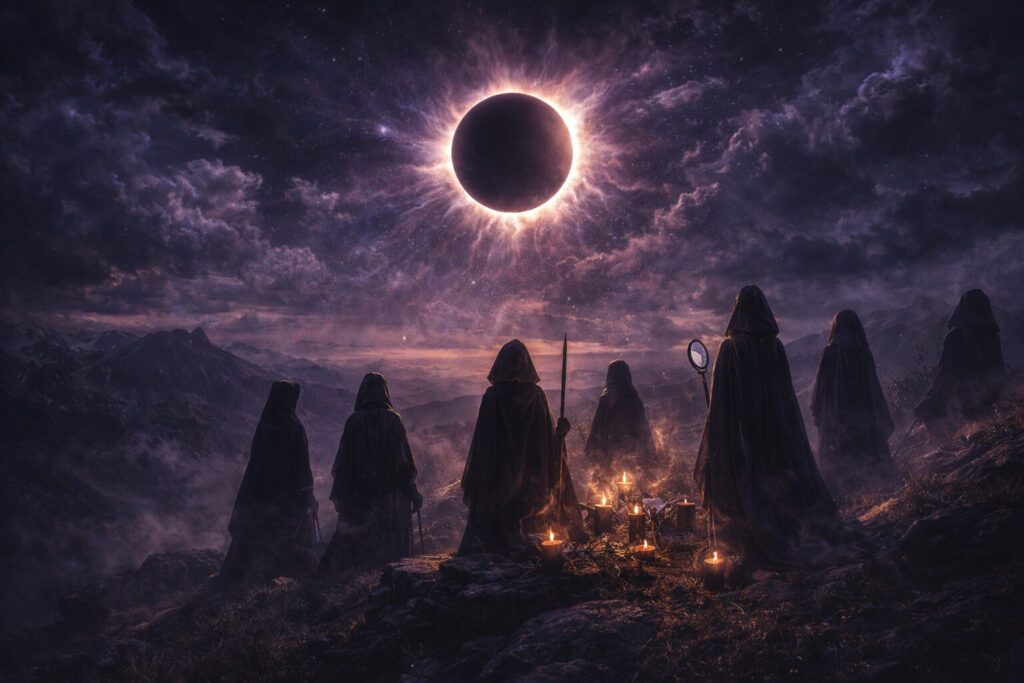
Eclipses — Workings
Eclipse magic is not casual “manifesting.” Treat it as threshold weather: potent, revealing, and less stable. Choose workings with clean boundaries, clear ethics, and a real plan for what happens after the shift.
The Eclipse Rulebook
What to do, what to avoid, and why this phase punishes fuzzy intention.
Best Eclipse Uses
- Protection recalibration (tighten wards, remove leaks, reinforce boundaries)
- Truth-seeing (what is hidden, denied, or misnamed)
- Severing entrenched patterns (habits, bindings, unhealthy attachments)
- Rites of passage (ending → beginning, initiation, “crossing the line” work)
- Course correction (small action with big leverage)
What to Avoid
- “Shake up my life” spells (they work too literally)
- Coercive love/workings (volatility + coercion = backlash and mess)
- Overly complex ritual theater (noise hides the signal)
- Huge multi-goal manifestation lists (eclipse punishes scatter)
- Working when emotionally dysregulated (you’ll feed the storm)
Protection Recalibration
A clean eclipse working: remove leaks, reinforce the boundary, restore sovereignty.
Tools (minimal)
- One candle
- Saltwater (or clean water + pinch of salt)
- One bell / chime (or simple clap)
- Optional: a key or ring (sovereignty symbol)
Boundary Clause
Write and speak a single clause such as: “Only what is aligned and honorable may enter. All else is refused.” (Plain language > poetry.)
- Stand at your threshold (doorway) and name your boundary in one sentence.
- Trace the boundary with saltwater (or fingertip) while repeating the clause.
- Ring the bell (or clap) once in each corner / room — “wake the edges.”
- Hold the key/ring and state: “My life answers to my standards.”
- Extinguish candle and end cleanly. No lingering, no theatrics.
Truth-Seeking Without Self-Deception
A disciplined divination approach for eclipse windows: signal over intensity.
Best Questions
- “What am I refusing to see?”
- “What pattern is ending, whether I like it or not?”
- “What boundary restores my power?”
- “What is the smallest true next step?”
What to Avoid Asking
- “Will everything be okay?” (too vague)
- “Tell me the future” (eclipse gives weather, not certainty)
- “How do I make them…?” (coercion invites distortion)
- Multi-part questions (scatter = noise)
3-Card Eclipse Spread
- What is being eclipsed? (hidden factor / denial / shadow)
- What is being revealed? (truth emerging / consequence / clarity)
- What is the boundary? (the standard that keeps the shift clean)
Severing a Stubborn Pattern
A non-theatrical eclipse rite for ending what has proven itself unworthy.
What you need
- Small strip of paper
- String or thread (one piece)
- Heat-safe dish
- One candle
Write it plainly
On the paper: name the pattern in one line (e.g., “doom scrolling,” “answering disrespect,” “returning to X”). No story, no justification.
- Tie the thread once around the paper: a simple loop.
- Say: “This pattern has had its time. I withdraw my permission.”
- Cut the thread (one cut) and place both pieces in the dish.
- Burn the paper safely (or tear it into tiny pieces if you don’t burn).
- Dispose outside the home, then do one real-world action that supports the ending.
Coven Practice: The Corridor Rite
Group work for eclipse windows: roles, boundaries, and a shared standard.
Roles (keep it clean)
- Anchor: keeps the intention steady
- Witness: tracks outcomes & misfires honestly
- Guardian: enforces ethical boundaries
- Closer: ends the rite firmly (no lingering)
Shared Sentence
Example: “We step through change with honor and protection. What is unworthy is refused.”
(Write your own, but keep it one sentence.)
Three-Part Corridor Flow
- Open: boundary clause spoken together (3 times, steady voice)
- See: one divination pull per person (only one) — “what must be faced?”
- Close: one agreed aftercare action each member completes within 48 hours
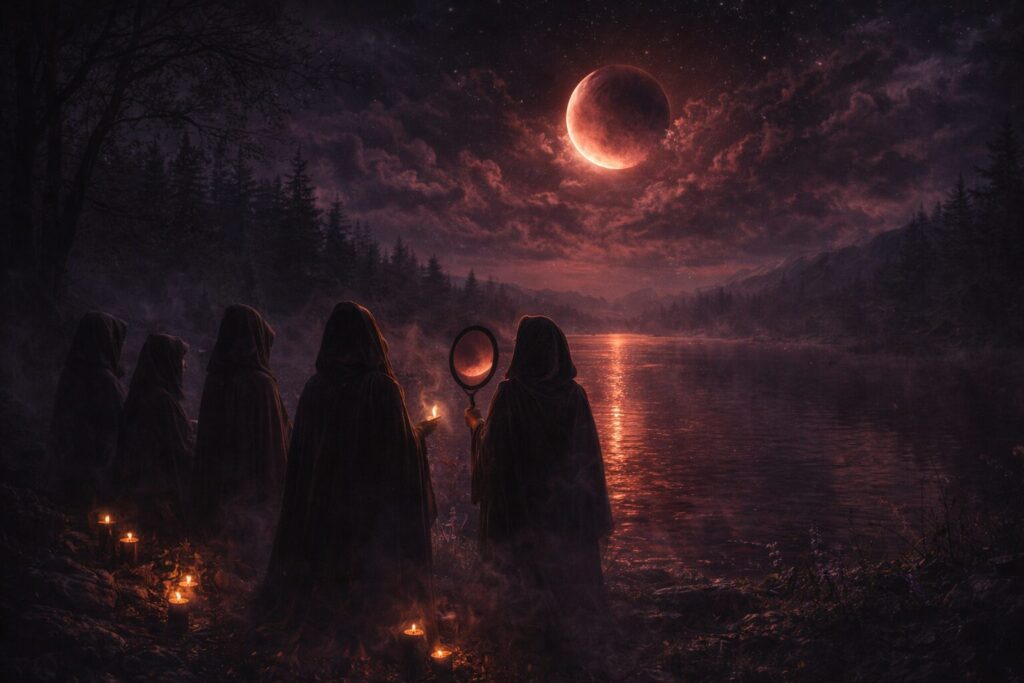
Eclipses — The World’s Old Language for Stolen Light
Across cultures, eclipses are rarely “neutral.” They read like an interruption of order: a swallowing, a veiling, a celestial argument. In practice, you can treat these stories as symbolic instruction: eclipse energy brings volatility, truth-exposure, and threshold movement — powerful, but not casual.
The Veil / The Interruption
A temporary shutdown of the familiar lights. The eclipse archetype teaches that orientation can fail — and that power sometimes arrives as reordering rather than “more energy.”
Corona, Shadow, Threshold Weather
Eclipses make edges visible: the halo around darkness, the line where light ends. They’re a reminder that the most revealing moments are often liminal — neither day nor night.
“Something Swallows the Light”
Dragons, wolves, serpents, or hungry spirits devouring the Sun or Moon appear in many traditions. Symbolically, the message is consistent: interruption has teeth — it demands attention.
Rahu / Ketu and the “Grasping Shadow”
In Hindu tradition, eclipses are often linked with the shadow beings Rahu and Ketu — an image of appetite, consequence, and the strange intelligence of disruption.
Wolves in the Sky
Northern European motifs sometimes frame cosmic light as pursued or devoured — an image of inevitability: the moment arrives when the chase catches up.
The “Unmasking” Current
Occult traditions often treat eclipses as unmasking: hidden motives surface, weak structures crack, and truth becomes harder to avoid. This favors rites of course-correction and clean endings.
Eclipses — Lines on Interruption
Eclipses are “threshold weather”: a moment when the familiar lights fail, attention sharpens, and reality feels less negotiable. These voices aren’t doctrine — they’re witnesses to what interruption does to the human mind.
Methinks it should be now a huge eclipse / Of sun and moon, and that the affrighted globe / Should yawn at alteration.
You may read that the moon has something to do with eclipses. I have never seen the moon yet.
One does not become enlightened by imagining figures of light, but by making the darkness conscious.
The sun and the moon do not eclipse because of the death of someone… they are two signs… When you see them, stand up and pray.
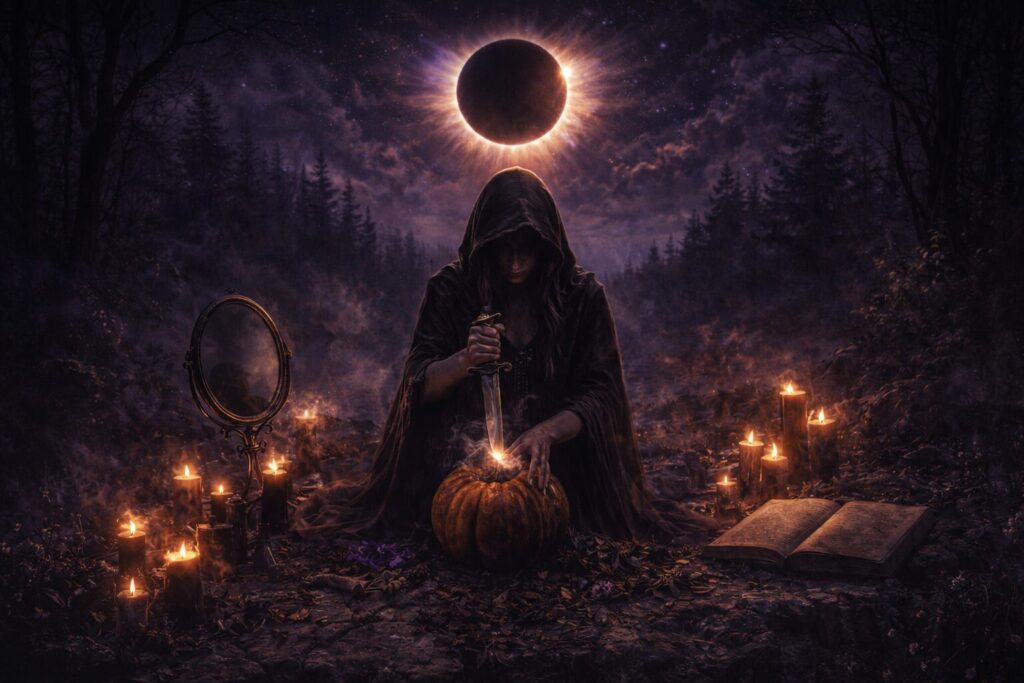
Eclipses — Deep Dive Reflection
Eclipses feel “bigger” because they interrupt the brain’s sense of a stable world. In magical terms, that interruption can expose truth and accelerate endings — but it also increases projection, volatility, and the temptation to mistake intensity for guidance.
Threshold Intelligence
Why eclipse moments feel fated: disruption compresses meaning and forces choice.
What eclipses do well
- Expose the weak joint in a structure
- Reveal what is already true but unspoken
- Accelerate a decision you’ve avoided
- Turn “background issues” into foreground reality
What eclipses do poorly
- Comfort and reassurance
- Stable “growth magic” (that’s Waxing/Full)
- Multi-goal planning
- Any work that depends on emotional steadiness you don’t currently have
Intensity Is Not Authority
How to tell revelation from projection when the sky feels “loud.”
Signs it’s revelation
- It clarifies boundaries
- It reduces contradiction
- It produces a sober next step
- It holds up the next morning
Signs it’s projection
- It demands urgency and spectacle
- It creates enemies everywhere
- It inflates your role in the story
- It collapses into shame or obsession later
Ethics Under Shadow
Why eclipse coercion backfires: volatility magnifies consequence.
Clean eclipse ethics
- Protect the self and home
- Tell the truth (without cruelty)
- End what is already toxic
- Choose sovereignty over control
Where people slip
- Using “fate” to justify harm
- Calling obsession “destiny”
- Confusing vengeance with closure
- Doing huge workings without aftercare
Integration: What Happens After
Eclipse power lands in the days/weeks after: stabilizing the new reality.
48-hour integration
- Sleep, hydrate, eat like a person
- One practical boundary action
- One honest conversation (if needed)
- Write: “what changed?” in one paragraph
2-week integration
- Track repeating themes (not coincidences)
- Reduce commitments that don’t match the new truth
- Choose one stabilizing practice (daily, small)
- Re-seed at the next New Moon
Reflection Prompts
Use these instead of “big spells” when the current feels too loud.
- What is being eclipsed? What truth have I kept in peripheral vision?
- What is being revealed? What does reality keep repeating until I acknowledge it?
- What boundary restores my power? What standard am I finally ready to enforce?
- What ends cleanly? What has proven itself unworthy of further feeding?
- What stabilizes me? What simple daily act would make this transition safer?
The Coronagraph Rite
Eclipses are not ideal for “big getting” magic. They are ideal for clear seeing and clean endings — a brief rite to stabilize the nervous system, name the truth that’s surfacing, and close a door without theatrics. This working is designed to be safe, bounded, and covenant-honest.
When to do this
- During an eclipse window or within 24–72 hours after, when the meaning is landing.
- When you feel “too much signal” and need clarity instead of escalation.
- When something is ending and you want closure without hostility.
What you need
- One small candle (tea light is perfect)
- A bowl of water (to reflect — and to cool)
- One pinch of salt (or a small stone)
- One sentence of truth (written)
The Working (7 Steps)
- Reduce the room: silence notifications; sit. Say: “I will not dramatize this.”
- Light the candle: treat the flame as your steady baseline — the part of you that remains.
- Salt the water: add the pinch and stir once clockwise, once counterclockwise. Say: “Truth, then calm.”
- Look into the water: breathe slowly for 9 breaths. Notice what repeats in your mind without forcing it.
- Name the truth: read your one-sentence truth aloud (once). No poetry; no bargaining.
- Close the door: say: “What is not for me is finished.” Then touch the bowl and imagine the door sealing.
- Ground and end: extinguish the candle. Wash your hands. Eat something small. Return to ordinary life.
Eclipses are reminders that power is not always additive. Sometimes it arrives as subtraction, interruption, or revelation. The light does not disappear to frighten the world; it disappears to demonstrate that orientation is conditional. What we call stability is often a pattern we forget to question until it falters. The eclipse makes the pattern visible by breaking it.
For the practitioner, this phase is less about doing and more about witnessing. A skilled witch knows that not every current is meant to be ridden. Some are meant to be observed. Eclipse periods reward restraint, clarity, and a willingness to let truth surface without immediately trying to shape it into comfort. They are teachers of humility in the face of cosmic scale. The sky itself rehearses impermanence.
What is revealed during an eclipse is rarely new. It is usually something already known, but not yet admitted. The work is not to invent meaning, but to recognize it. When the shadow passes, the world resumes its familiar geometry — yet the memory of interruption lingers. That memory is the gift. It teaches that identity, relationships, and paths are not fixed structures; they are agreements continuously renewed.
To walk the eclipse well is to accept that revelation is not a catastrophe. It is a recalibration. After the light returns, the practitioner does not rush to celebrate or dramatize. They adjust their course quietly. They tighten what must hold, release what must end, and move forward with a clearer sense of proportion.
The eclipse does not ask you to become someone else. It asks you to become more honest about who you already are.
Keep Going Through the MCC Archive
If eclipses cracked something open, these pages help you stabilize, study, and practice with clarity.
